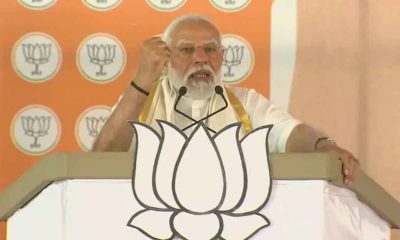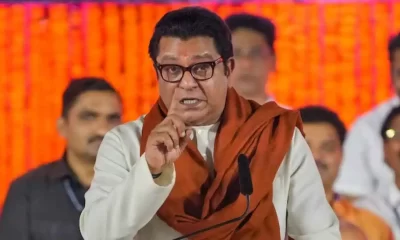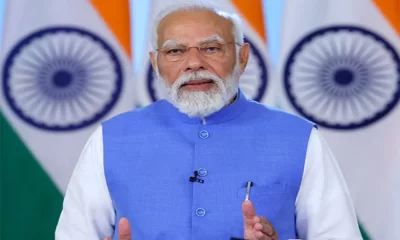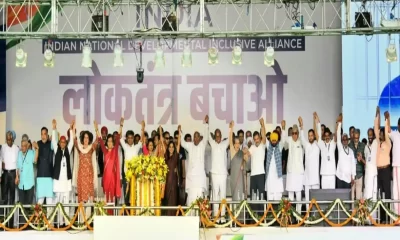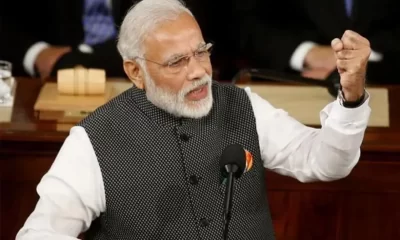India News
President Kovind’s Maiden Address to Parliament Focuses On Social Sector
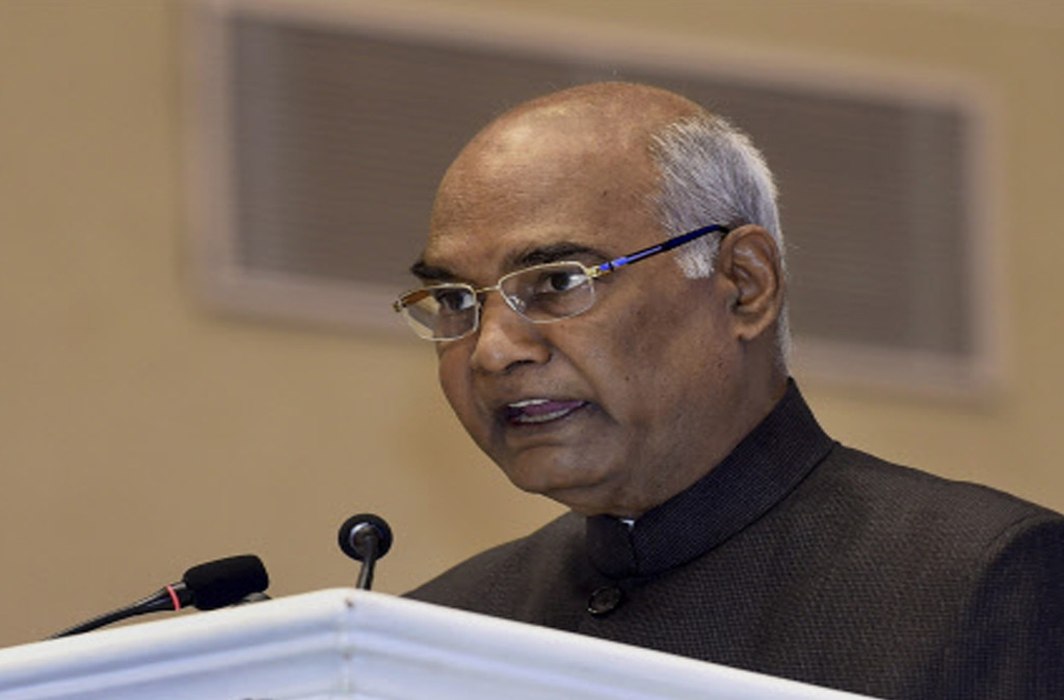
A focus on social sector and welfarism, highlighting the government’s move to restore Muslim women’s honour through the bill criminalising triple talaq, and pitching for simultaneous Lok Sabha and state assembly elections marked President Ram Nath Kovind‘s maiden address to the joint sitting of both Houses of Parliament on Monday, January 29.
This also a session that will see the last full budget to be presented in this term of the Narendra Modi government and, perhaps expectedly, the President’s speech, which is a reflection of the government’s priorities, was more about steps taken to improve the lives of the people rather than about economic growth and big projects and deals.
President Kovind started with the observation that Heads of States and Governments of ten ASEAN countries during this year’s Republic Day added a special dimension to India’s vision of ‘Vasudhaiv Kutumbakam’.
He said 2018 would be a special year to realise the vision of New India before moving on to the main part of his speech.
Recalling the statement of the architect of the Constitution, Baba Saheb Dr BR Ambedkar, that political democracy cannot survive without social and economic democracy, the President said that the government, “guided by this fundamental spirit of the Constitution and committed to the welfare of weaker sections, is working towards strengthening social justice and economic democracy and to usher ease of living for the common man.”
Women:
Referring to the Swachchh Bharat mission and drive to construct toilets, he said, “Perhaps no one had imagined that construction of toilets could also contribute towards social justice. Construction of toilets not only protects their dignity but also fosters a feeling of social justice in women.”
“It is our collective responsibility to pay a befitting tribute to Pujya Bapu by making the country Swachh by 2019 when we celebrate the 150th birth anniversary of the Father of the Nation, Mahatma Gandhi,” he said. He mentioned ‘Pradhan Mantri Ujjwala Yojana’ as another major step towards improving the lot of women, saying over 3.30 crore cooking gas connections were provided under the scheme to rid the women of the ill effects of smoky kitchens on the health of women and their children.
The Triple Talaq Bill was also a step to emancipate the Muslim women who, said the President, would be able to “live a life of self-respect with courage” once the Bill was enacted. He expressed the hope that the Bill would soon be enacted.
Extending the ‘Beti Bachao Beti Padhao‘ scheme from 161 districts to 640 districts and amending the Maternity Benefit Act to provide for 26 weeks of paid leave in place of 12 weeks were other steps for women’s welfare that the government has taken.
For further strengthening ‘economic democracy’, he said the government was moving towards “bridging the gap between the country’s banking system and the poor”.
“Under the ‘Jan Dhan Yojana’, so far, about 31 crore bank accounts have been opened for the poor. Women have especially benefitted from the scheme with the percentage of Savings Bank accounts held by them going up to more than 40 per cent from the earlier 28 per cent,” the President said.
On the issue of employment, the President said that to encourage self-employment, the government has facilitated provision of credit without insisting on bank guarantee. “Under the ‘Pradhan Mantri Mudra Yojana’, about 10 crore loans have been sanctioned so far and more than Rs. 4 lakh crore worth of loans have been disbursed. About 3 crore first time beneficiaries have received assistance under this scheme for self employment,” he said.
“The endeavour of the Government towards strengthening economic and social democracy is helping redefine our national life. These efforts are establishing a new social order in the country which provides equal opportunity to the poor to march ahead,” he added.
Farmers found special mention. “The highest priority of my Government is to remove various difficulties faced by farmers and to raise their standard of living. The schemes of my Government are not only removing their hardships but also reducing the expenditure incurred by them on farming,” said the President.
He said, “As a result of Government’s policies and the hard work of farmers, a record production of more than 275 million tonnes of food grain and about 300 million tonnes of horticultural produce has been achieved in the country.”
He reiterated the government’s promise of “doubling of farmers’ income by 2022.”
“To ensure remunerative price to the farmers for their produce, the agriculture mandis are being connected online. So far, agricultural commodities valued at about Rs. 36 thousand crore have been traded on e-NAM portal,” he said.
“Government is also protecting the interests of farmers by giving production bonus on pulses and oil seeds. As a result of Government’s policy for pulses, their production went up by more than 38 per cent as compared to last year, which is a record.
“To prevent damage to agriculture produce before it reaches the market and to ensure its safe storage, “Pradhan Mantri Kisan Sampada Yojana” has been launched. The supply chain and infrastructure in the agricultural sector are being modernized under this scheme,” said President Kovind.
Further, he said, an ambitious scheme has been introduced in the Dairy sector under which a ‘Dairy Processing Infrastructure Development Fund’ with a corpus of Rs. 11 thousand crore is being set up to enhance the income of farmers.
He said the government is working to remove the feeling of economic insecurity among the poor, farmers and senior citizens.
To this end, under ‘Pradhan Mantri Fasal Bima Yojana’, farmers are being provided affordable and simple crop insurance services and under Rabi & Kharif crops, 5 crore 71 lakh farmers were provided protective coverage under this scheme during 2017, he said.
The government has introduced insurance schemes for the poor at a premium of 1 rupee per month and 90 paise per day and more than 18 crore poor have been covered under the ‘Pradhan Mantri Suraksha Bima Yojana’ and ‘Pradhan Mantri Jeevan Jyoti Bima Yojana’, he said, adding that about Rs. 2 thousand crore has been paid out as claims.
The ‘Atal Pension Yojana’ has been brought for the social security of senior citizens and about 80 lakh senior citizens have benefitted by the scheme, he said.
The government is developing mechanisms to ensure that benefits of development reach the poorest of the poor, he said, adding, “About 2 lakh 70 thousand Common Service Centres have been set up that provide digital services at low cost, even in the remotest areas of the country. Under the ‘Bharat Net Project’, the Government is providing broadband connectivity to 2 lakh 50 thousand Gram Panchayats. In the first phase, more than one lakh Panchayats have already been connected. This project will play a major role in taking e-health, e-education, e-governance and e-commerce to each village of the country.”
Under the ‘Pradhan Mantri Gram Sadak Yojana’, more than 82 per cent villages mostly in far flung and inaccessible areas have been connected by roads, as compared to 2014 when only 56 per cent of the villages had road connectivity. “Our target is to provide road connectivity to every village by 2019,” he said.
The distribution of food grains at cheap rates under National Food Security Act is being made transparent and leakage proof in all States of the country.
At a time when several politically influential, socially dominant sections are pressing for reservation under PBC category, the government has also moved a Constitution Amendment Bill to provide Constitutional Status to the National Commission for Backward Classes. The President said it showed that the government is sensitive towards the aspirations of every section of society.
“A Commission has been constituted to examine the sub-categorization of backward classes so that the benefits of higher education and jobs can be availed by the most backward sections among the backward classes,” the President added.
For the welfare of tribals, the President listed government steps including Minimum Support Price of several forest produce collected by the tribal people, excluding bamboo from the category of tree, and Adivasi Swatantrata Sangram Sangrahalayas to honour the invaluable contribution of tribal communities in the independence struggle.
The President said that for the empowerment and economic inclusion of persons with disabilities, the government has enacted the ‘Rights of Persons with Disabilities Act 2016’. Provision has been made for 4 per cent reservation in government jobs and 5 per cent reservation in higher education for them.
He said with regard to minorities, the government is committed to “Empowerment and not Appeasement” and is making intensive efforts for economic, social and educational empowerment of the minorities.
“Employment opportunities have been provided to the youth belonging to Muslim, Christian, Sikh, Buddhist, Parsi and Jain communities through programmes, such as, ‘Seekho Aur Kamao’, ‘Usttad’, ‘Garib Nawaz Kaushal Vikas Yojana’, ‘Nai Roshni’ etc. More than 45 lakh students have also benefitted from scholarships, fellowships, skill development and coaching schemes during the last one year,” he said.
For housing, the government is targeting to provide a house with availability of water-electricity-toilet facility to every poor and homeless household by the year 2022 and over the last three and a half years, more than 93 lakh houses have been constructed by the Government in rural and urban areas, said President Kovind.
To alleviate the financial burden of treatment of disease further aggravates the suffering, the President said that the government has formulated a ‘National Health Policy’ for providing better and affordable healthcare facilities to the poor and middle class.
“Through the ‘Pradhan Mantri Jan Aushadhi’ Kendras, 800 different medicines are being made available to the poor people at affordable rates and more than 3 thousand such kendras have been established in the country. Under the ‘Deendayal Amrut Yojana’, over 5200 lifesaving branded medicines and surgical implants are being provided through 111 outlets at discounts ranging from 60 per cent to 90 per cent,” he said.
“In addition to medicines for heart patients, the cost of stent has been reduced up to 80 percent. The cost of knee implant has also been regulated. Under the ‘Pradhan Mantri National Dialysis Programme’, in over 500 districts, more than 22 lakh dialysis sessions for 2.25 lakh patients have been conducted at discounted rates,” the President said.
To enhance the availability of doctors, 7 thousand post graduate seats and over 13 thousand MBBS seats have been approved and the government has also introduced the ‘National Medical Commission Bill’ in the Lok Sabha to ensure quality and transparency in medical education.
Speaking about steps to address the problem of unemployment, the President talked about the measures and schemes taken to help self-employment. He mentioned programmes like Start Up India, Stand Up India, Skill India Mission, Mudra Yojana to provide self-employment to the youth and two schemes – ‘SANKALP’ and ‘STRIVE’ for skill development of youth in line with the needs of the industry.
“Enterprises or companies creating new employment opportunities are being provided financial assistance under the ‘Pradhan Mantri Rojgar Protsahan Yojana’. Over 20 lakh people have benefited under this scheme. About 5 lakh youth have benefitted under the ‘National Apprenticeship Promotion Scheme’,” President Kovind said.
To promote sports, the President said International Sports Competitions like FIFA Under-17 World Cup and Asian Athletic Championship were organised, an ambitious campaign namely ‘Khelo India Programme’ with an outlay of over Rs. 1750 crore has been started. A ‘Sports Talent Search Portal’ has been started for transparent selection of talented sportspersons and a scheme has been launched to provide stipend of Rs. 6 lakh per annum to one thousand talented sportspersons.
The President noted the achievements in India’s space programme, spoke of the Digital India Mission, steps for development and modernisation of Railways, the Bharatmala programme for highways, and ‘Jalmarg Vikas Pariyojana’ for waterways.
To provide air connectivity to smaller cities and to enable the lower middle class, middle class and young people to fly, “Ude Desh ka Aam Nagrik” or ‘UDAN’ scheme has been launched, he added.
In power generation, the President said that for the first time, increase in Power generation capacity in the country has exceeded the target and India has become a net exporter of power.
He said the mission to save electricity and efforts to increase electricity production are moving hand in hand and “in last three years, solar energy generation has increased by seven times.”
“Owing to Indian efforts, the International Solar Alliance has now become a legal entity,” he said, “its headquarter has been set up in India.”
The President also spoke about India’s successes in foreign affairs and winning international recognition, its achievement in sustaining high economic growth rate, GST, the efforts to re-capitalise the public sector banks, the fight against corruption and the improvement in Ease of Doing Business ranking.
Towards the end, the President came to Modi government’s preference for having simultaneous Lok Sabha and state assembly elections to say, “Citizens alive to the state of governance in the country are concerned about the frequent elections in one part of the country or another, which adversely impact the economy and development. Frequent elections not only impose a huge burden on human resources but also impede the development process due to the promulgation of the model code of conduct. Therefore, a sustained debate is required on the subject of simultaneous elections and all political parties need to arrive at a consensus on this issue.”
He concluded with a call to work for nation building to strengthen the foundation of New India by 2022, when the Nation celebrates the 75th year of Independence.
2024 Lok Sabha Elections
Smriti Irani takes a swipe at Rahul Gandhi for calling Amethi his home but contesting Lok Sabha elections from Wayanad
Smriti Irani criticised the Rahul Gandhi for changing his families and said they have seen people changing colours, but for the first time changing families is being witnessed.
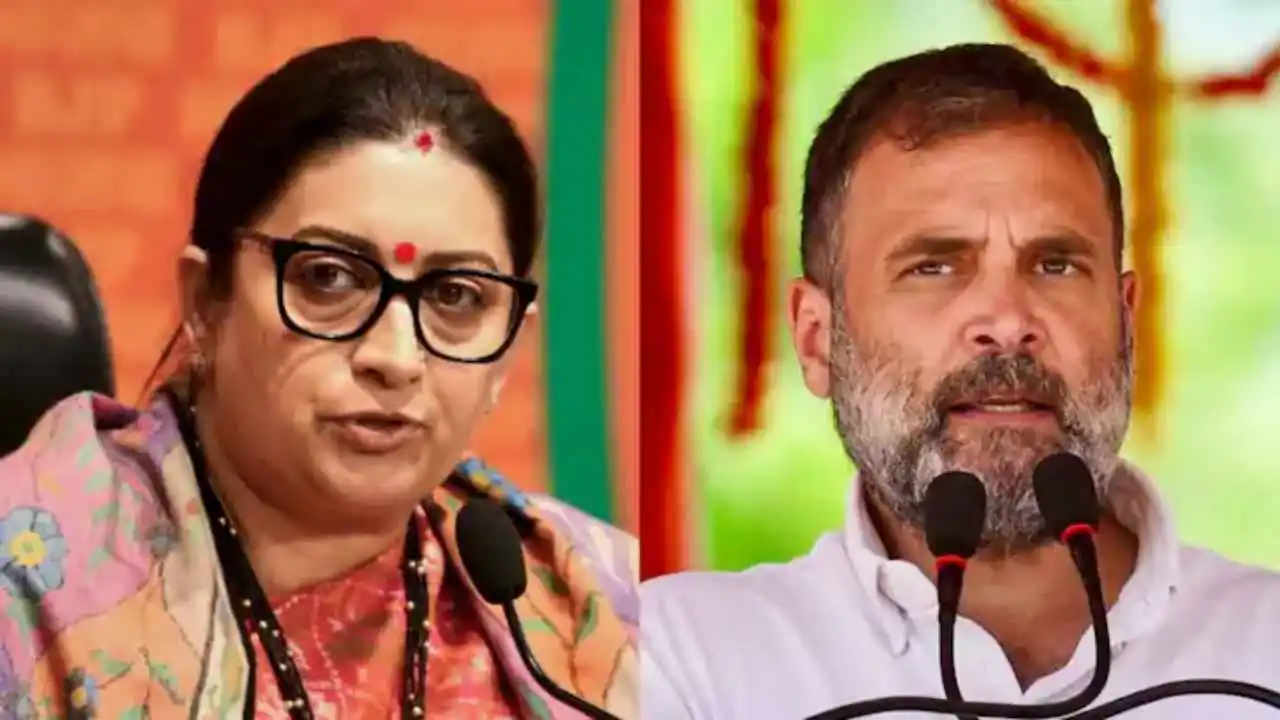
Union Minister Smriti Irani took a swipe at Rahul Gandhi on Saturday during a rally in Uttar Pradesh’s Amethi. While addressing the public rally, Irani said Rahul Gandhi spoke about his relations in Amethi and then he went to Wayanad where he declared the Kerala seat as his home as he filed for his nomination for the Lok Sabha elections.
Smriti Irani, who will be contesting her Amethi seat yet again, criticised the Rahul Gandhi for changing his families and said they have seen people changing colours, but for the first time changing families is being witnessed. The Union minister urged the people of Amethi to cast their votes on May 20, the day when Amethi goes for elections. She talked about the benefits of voting for BJP and said, the poor will get free ration for five years, farmers will get Rs 6,000 every month, and will get Rs 5 lakh every year under the Ayushman Bharat scheme.
Irani further added that Congress on the other hand has declared that it will calculate the wealth of the people if voted to power. She took a swipe over Congress candidates and said the grand old party is yet to announce its candidates for two key constituencies in Uttar Pradesh – Amethi and Raebareli, which have historically been the Congress’s stronghold. The BJP leader said that now that the polling in Wayanad has concluded, the Congress candidate will arrive in Amethi, but will first visit the Ram Temple.
She slammed Congress for rejecting the invitation to the Ram Temple Pran Pratishtha and said they rejected the invitation to the Ram temple Pran Pratishtha, now they will go to the Ram temple as they believe that this will get them votes in the ongoing Lok Sabha elections which means now they will go to the extent of betraying god as well.
2024 Lok Sabha Elections
Lok Sabha election 2024: Nearly 50% voter turnout recorded in second phase till 3 pm
The constituencies going to polls today include all 20 Lok Sabha seats in Kerala, 14 in Karnataka, 13 in Rajasthan, and others spread across different states.
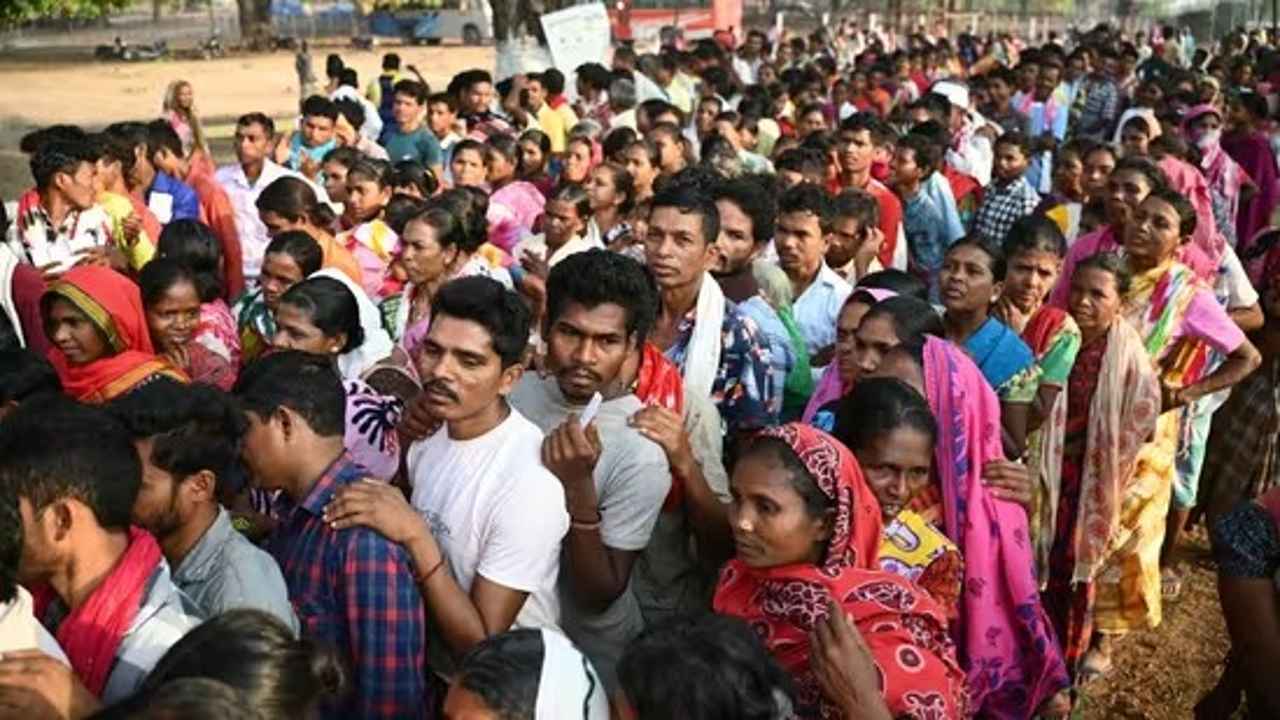
In the second phase of Lok Sabha elections 2024, over 50% of voters were registered in 13 states and the UTs till 3 p.m. 65% of voters participated in the first round of the Lok Sabha elections.
The 18th Lok Sabha elections are currently in their second phase, with voting for 88 seats taking place across 13 states and union territories. There are more than 1,200 people running for office, four of them are from outside Manipur.
Union minister Rajeev Chandrasekhar, BJP members Tejasvi Surya, Hema Malini, and Arun Govil, Rahul Gandhi and Congress leader Shashi Tharoor, DK Suresh, the brother of Karnataka Deputy Chief Minister DK Shivakumar, and former chief minister HD Kumaraswamy are among the notable contenders for the second phase.
In 2019, the NDA had won 56 of the 89 seats and the UPA 24. Six of these seats have been redrawn as part of the delimitation exercise.
The first phase of the seven stages of the elections took place on Friday, including 102 seats spread across 21 states and Union territories. Voter turnout was about 65.5% in the first phase, according to the reports.
In biggest festival of democracy, people from all walks of sector took part in it. A video went viral where former India captain and current Indian team head coach Rahul Dravid and former India player and head coach Anil Kumble were seen standing in line to cast their vote.
Meanwhile, voting started at 7 a.m. and will end at 6 p.m. The Election Commission has extended voting hours for those who are in line by an hour. According to Election Commission figures, the first two hours saw a 9.3% voter turnout throughout the 88 constituencies. By 9 am, Kerala had recorded 8.52%, Karnataka 9.21%, and Madhya Pradesh 13.82%.
In this phase, there were about 15.88 crore eligible voters, comprising 5.929 third-gender electors, 8.08 crore males, and 7.8 crore women. 3.28 crore young voters, aged 20 to 29, are among them; 34.8 lakh of them are first-time voters.
2024 Lok Sabha Elections
Lok Sabha elections 2024: 102-year-old man walks to polling booth to cast his vote in Jammu
The lowest voter turnout so far was noted in Ramgarh at 1.53%.
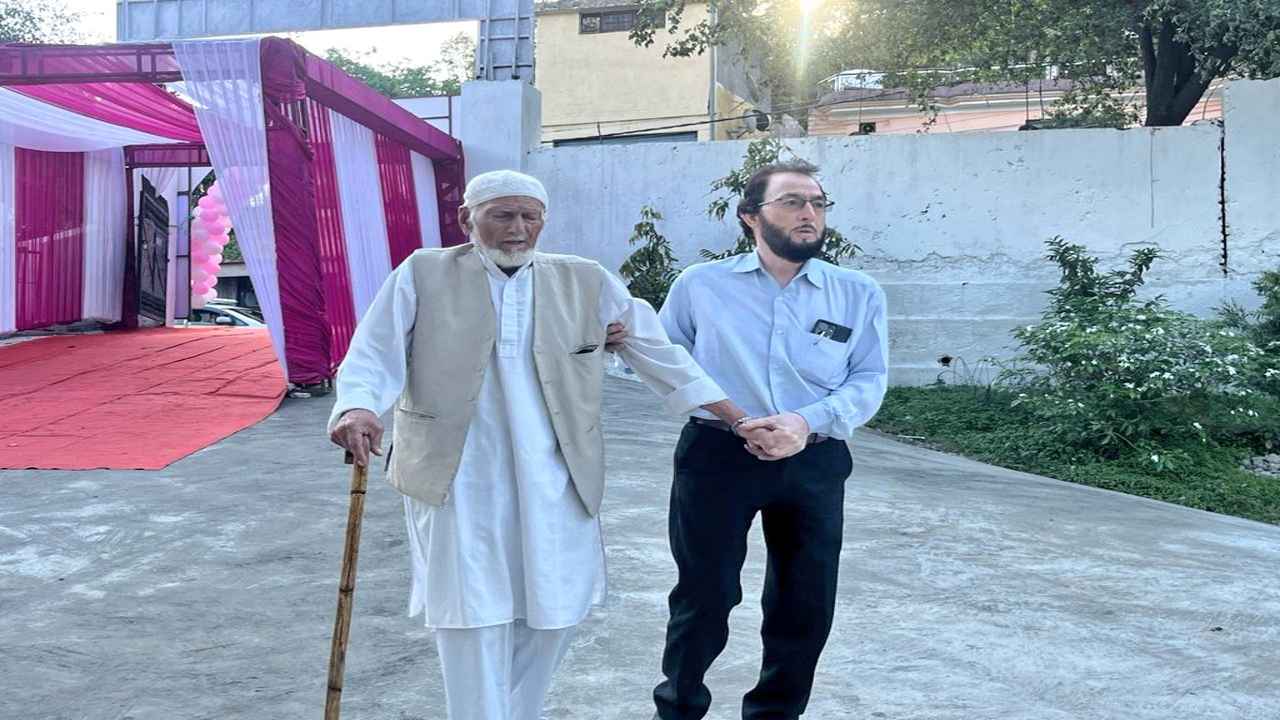
A 102-year-old man showed up at a Jammu polling place to cast his vote in the second phase of the Lok Sabha elections on Friday. Haji Karam Din arrived at the Reasi district polling place in the Jammu constituency with a walking stick in hand and a family member who assisted him with the pre-voting process.
Haji Karam Din, who is 102-year-old, showed his inked finger and posed for pictures outside the polling booth after casting his vote. He said voting at this polling place at this age makes him very happy. He has always cast his vote. Even at the age of 102, this experience is still ongoing, he said.
Reasi district is a part of the Jammu parliamentary constituency, and 22 candidates are up for vote with around 17.81 lakh eligible voters.
BJP’s sitting member Jugal Kishore Sharma is aiming for a third term in office following wins in the elections of 2014 and 2019. Former minister and Congress candidate Raman Bhalla is his main opponent.
Voting in the Jammu-Reasi Lok Sabha constituency began with eager voters showing up at the polling places. Some of them were wearing traditional Dogra attire.
In 2,416 polling places around the constituency, voting got underway at 7 a.m., and 10.39% of the total votes were cast by 9 a.m. In the 2019 Lok Sabha elections, Jammu recorded a 74% voter turnout.
Following the repeal of Article 370 and the division of the former state into two Union Territories five years ago, this is Jammu’s first significant election.
The Akhnoor segment received the highest percentage of votes, 14.24%, followed by Reasi (14.13%), Gulabgarh (13.53%), Shri Mata Vaishnodevi (12.71%), Marh (12.31%), Samba (8.56%), R S Pura Jammu South (8.17%), and Suchetgarh (5.67%), according to the officials. Ramgarh recorded the lowest voter participation of 1.53% so far.
Low attendance was observed in the border areas of the districts of Jammu and Samba till nine in the morning, according to poll data.
The officials said that big lines of voters were observed at several polling places throughout Jammu city. Voters were observed heading towards polling places early in the morning.
-
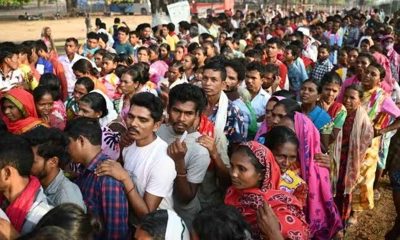
 2024 Lok Sabha Elections22 hours ago
2024 Lok Sabha Elections22 hours agoLok Sabha election 2024: Nearly 50% voter turnout recorded in second phase till 3 pm
-
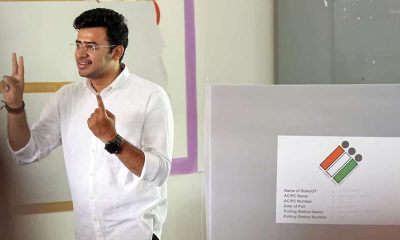
 2024 Lok Sabha Elections21 hours ago
2024 Lok Sabha Elections21 hours agoElection Commission books BJP MP Tejasvi Surya for seeking votes in the name of religion
-

 Cricket news4 hours ago
Cricket news4 hours agoIPL 2024: Punjab Kings beat Kolkata Knight Riders by 8 wickets to chase down highest T20 total
-

 2024 Lok Sabha Elections2 hours ago
2024 Lok Sabha Elections2 hours agoSmriti Irani takes a swipe at Rahul Gandhi for calling Amethi his home but contesting Lok Sabha elections from Wayanad
-
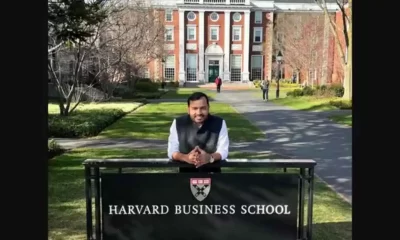
 Education8 mins ago
Education8 mins agoPhysics Wallah gets invited as speaker to Harvard University, Stanford University and University of California, post goes viral

